Opening the door: Making the case for renewed US-Cuban relations

January 6, 2015
In February 1962, President John F. Kennedy gave clear orders to his press secretary, Pierre Salinger. Kennedy pleaded, “I need cigars.” By the following day, the President was in possession of more than 1,000 freshly hand-rolled Cubans.
What else happened that day? American trade with Cuba ceased, as our 35th president banned the importation of all Cuban products into the United States — building upon the prohibition of U.S. exports to Cuba, which the Eisenhower administration implemented two years earlier.
On Tuesday, Dec. 17, our 44th president announced efforts to end both the overly strict travel restrictions between the two countries and the stringent US-Cuban embargo that has been in place for more than 50 years.
Lawmakers received President Obama’s diplomatic move with mixed reviews. Sen. Marco Rubio, R-Fla., was outspoken in his criticism of Obama’s actions, calling the president’s efforts “another concession to tyranny.” Sen. Robert Menendez, D-N.J., also criticized Obama’s move, describing renewed US-Cuban relations as a “mistaken change of policy.” House Speaker John Boehner, R-Ohio, and Senate Majority Leader Mitch McConnell, R-Ky., held similar views.
There is no question that Rubio and Menendez’s views are passionately felt and expressed — both are of Cuban descent. Yet, policymakers must address US-Cuban relations by focusing on effectiveness and pragmatism regarding diplomacy and international economic growth. The issue is not a partisan one, with both democrats and republicans for and against it. Politics aside, let us simply ask ourselves: Has this half-century embargo brought democracy and prosperity to Cuba? Has it gained America ground on the geopolitical map? Has it served the interest of both Americans and Cubans?
It clearly has not.
Castro’s Cuba has a record of denying human rights, natural rights and civil liberties to its citizens. To say the least, freedom of speech and expression is not a fixture there.
But the embargo on exports and imports to and from Cuba has not changed any of that.
To argue that American policy toward Cuba should remain as is, because of tyranny and political repression, is inconsistent with reality. Americans are free to travel to countries such as North Korea, China and Russia. As Rep. Jason Chaffetz, R-Utah, has said, “It’s amazing to me, post-Cold War, that the United States of America will not allow me to travel to Cuba … You can travel to some pretty awful places, Americans should be able to make those decisions all by themselves.”
Economically speaking, the United States actively trades with China and Russia, despite each country’s prolonged problems with human and civil rights violations. In fact, China, a politically communist state, was the United States’ third-largest trade partner in 2013.
Now, the United States should never condone any violation of freedom and liberty, but effective policymaking needs focus. Policymakers must be pragmatic and foresighted in regard to relations with foreign states.
When dealing with communist countries, such as Cuba and China, American lawmakers must implement policy that promotes freedom, liberty and prosperity for that country’s people. These policies must include more economic flow between the two nations.
So what is the best approach Americans can take to to empower citizens of less-free nations?
Let us not just talk about the benefits of free markets; let’s show them. Manifesting these results in Cuba by increasing exports of American goods and setting up businesses is the greatest weapon with which Americans can arm the Cuban people in order to fight poverty, oppression and injustice.
By allowing a less-restrained flow of people and products into Cuba, the United States can tangibly spread its influence on the communist island just 90 miles south of Florida. Additionally, Cubans will get a taste of Western capitalism by allowing American goods and services to be bought and sold in Cuba and vice versa.
History proves that more open economic relations between countries is the most economically effective tool for international prosperity. As Robert Kagan includes in his book, “The World America Made,” between 1500 and 1820, annual global GDP grew at a rate of 0.3 percent. From 1820-1950 that rate was 1.6 percent, while 1950-2000 saw a growth rate of 3.9 percent. Much of this growth rested on the expansion of freer trade and the liberalization of global markets.
In fact, such measures have lifted millions of Chinese out of poverty — reducing China’s extreme poverty rate from 84 percent in 1980 to 10 percent today. While Mao Zedong, the communist founder of the People’s Republic of China, spewed anti-capitalist rhetoric during his reign from 1949-1976, his successors eventually adopted more relaxed and, consequently, fruitful economic measures that have allowed China to become the modern world’s powerhouse of economic growth. And, despite China’s continued political repression, it is indisputable that China is a more free, prosperous and open nation now than it was under Mao’s totalitarian regime.
So, in regard to Cuba, economic and political progress must start somewhere. Although Cubans will not realize great economic and political liberties overnight, re-opening US-Cuban relations is a crucial step in Cuba’s development into a free, democratic and prosperous society. As 20th century Nobel Prize-winning economist Milton Friedman argued in his 1962 book, “Capitalism and Freedom,” a people must realize economic freedom before its political freedom can flourish.
Leading by example, let Americans show the Cuban people such freedom so that, one day, they may be so inspired that the forces of tyranny and oppression can no longer prevail against them.
Matt is the Opinions Editor of The Pitt News and primarily writes about law, national politics and public policy.
Write to Matt at [email protected].







